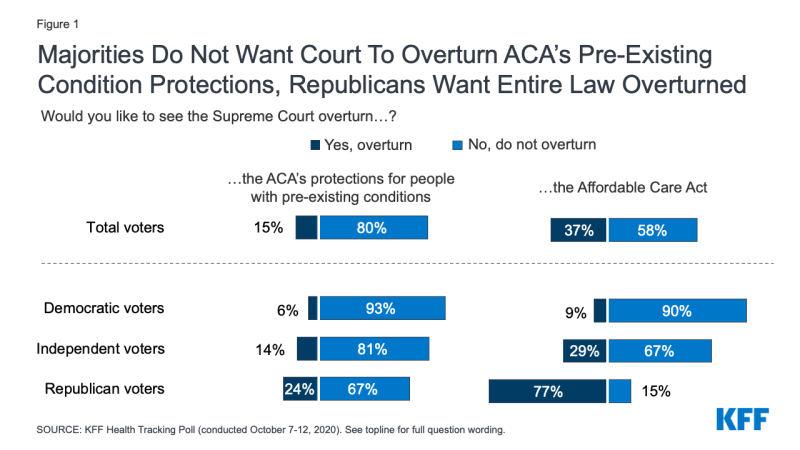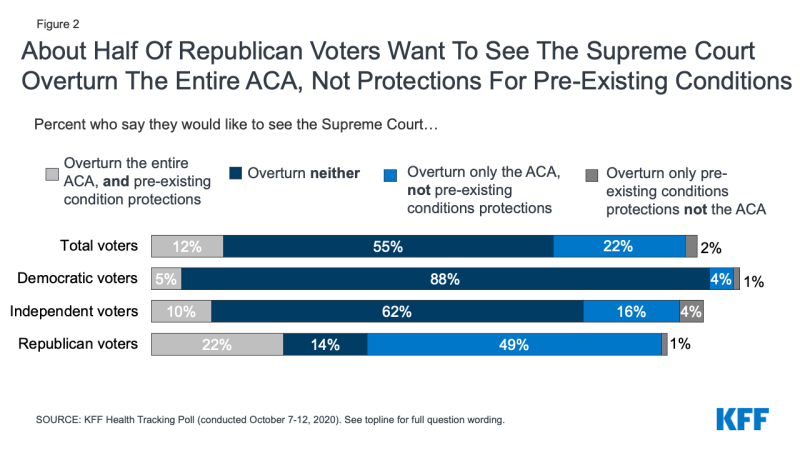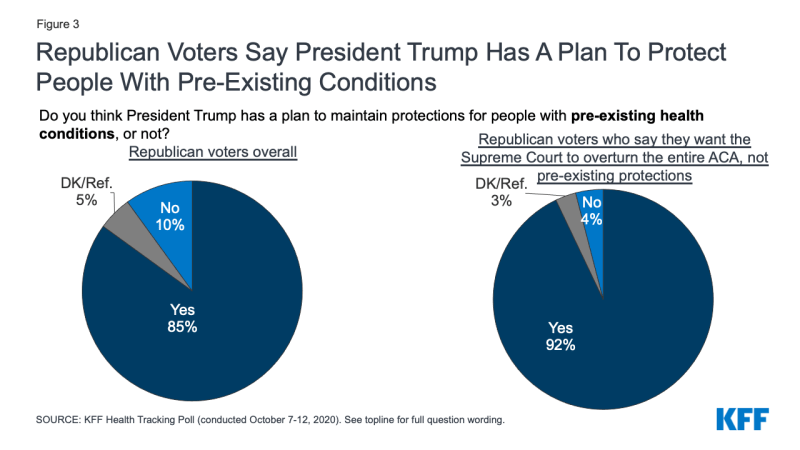A Conundrum: Majority of Republican Voters Want to Overturn ACA but Keep Protections for People with Pre-existing Conditions
Audrey Kearney
Published:
The latest KFF Health Tracking Poll revealed a stark contrast in opinion on two questions about the current challenge to the Affordable Care Act (ACA) facing the U.S. Supreme Court. Since it was enacted in 2010 by President Obama, the ACA, sometimes known as Obamacare, has been opposed by Republicans and favored by Democrats, but many of the benefits it provides are popular across parties. One of the most popular provisions of the law is that it protects people with pre-existing medical conditions from being denied coverage or having to pay more for coverage. A large majority of voters, across political party identification, say they do not want the Court to overturn the ACA’s protections for people with pre-existing conditions, but there are strong partisan differences on attitudes towards overturning the entire ACA. Two-thirds of Republican voters (67%) say they do not want the ACA’s protections for people with pre-existing conditions to be overturned, while three-quarters of Republican voters (77%) say they do want to see the ACA itself overturned.

Figure 1: Majorities Do Not Want Court To Overturn ACA’s Pre-Existing Condition Protections, Republicans Want Entire Law Overturned
This dichotomy is front-and-center as the now 6-3 conservative Supreme Court will hear California v. Texas on November 10th, a case supported by the Trump Administration aimed at overturning the Affordable Care Act. Possible outcomes include the Supreme Court overturning the entire ACA, or overturning certain provisions, including the pre-existing conditions protections. President Trump has been consistent in his messaging that even if the ACA is overturned, his administration will maintain protections for people with pre-existing conditions. The president signed an executive order that he has said will offer these protections. However, the executive order does not offer a clear plan for these protections, and as of now, these protections would not remain in place if the 2010 health care law were to be overturned.
KFF has been polling on the nuances of the ACA’s legal battles for years, and the issue came to the electoral forefront again during the 2018 midterm elections. KFF polls ask whether the public would like to see the Supreme Court overturn the entire Affordable Care Act, and separately, whether they would like the pre-existing protections it affords overturned. In some instances, KFF polling includes the argument that this may lead to some healthier people paying more for coverage. In the latest poll, Democratic voters and to a lesser extent independent voters, are consistent in their attitudes, with majorities opposing the Supreme Court overturning both the entire ACA and the pre-existing condition protections, but Republican voters answer very differently when the question is framed around overturning the entire law versus overturning these protections.
These seemingly conflicting attitudes among Republicans are likely a reflection of the messaging efforts of Republican lawmakers and the Trump Administration since 2016 – you can oppose the ACA and still support protections for people with pre-existing health conditions. In fact, about half (49%) of Republican voters say that they want to see the Supreme Court overturn the entire ACA, but not the law’s pre-existing condition protections. The Trump Administration has yet to put forward a plan laying out how they would maintain these protections in the absence of the ACA. Majorities of Democratic voters (88%) and independent voters (62%) say they do not want either the ACA or protections for pre-existing conditions to be overturned.

Figure 2: About Half Of Republican Voters Want To See The Supreme Court Overturn The Entire ACA, Not Protections For Pre-Existing Conditions
So, who are the Republicans who want to see the ACA overturned, but not its pre-existing condition protections? Demographic analysis indicates that they tend to be core supporters of President Trump. Large majorities of them identify as conservative (80%), strongly approve of Trump’s handling of his job as president (83%), and say they are either probably or definitely voting for the President’s re-election or have already done so (98%).
Furthermore, nearly nine in ten (85%) Republican voters overall say they think President Trump has a plan to maintain protections for people with pre-existing conditions, increasing slightly to 92% among those who want to see the ACA overturned but not the protections.

Figure 3: Republican Voters Say President Trump Has A Plan To Protect People With Pre-Existing Conditions
Maintaining protections for people with pre-existing conditions ranks among the top health care issues heading into Tuesday’s vote, with nearly nine in ten Democratic voters (87%), seven in ten independent voters (72%) and six in ten Republican voters (63%) saying it is a very important issue to their vote. But just one week later, the U.S. Supreme Court will be hearing oral arguments in the most recent legal battle over the 2010 health care law, making the future of the law uncertain. Most policy experts say detailed insurance regulations would need to be introduced to maintain protections for people with pre-existing conditions if the ACA were overturned. Without a Trump Administration plan in place, one might think that Republican voters’ preferences for overturning the ACA but keeping these protections are at odds with reality. However, their views are perfectly consistent with the messages they’ve been hearing from partisan leaders over the past several years. This is quite a common phenomenon when it comes to public opinion. Health policy is complicated, and the average voter doesn’t have the time or inclination to read through all the legal arguments associated with the ACA. In this environment, voters look to party leaders for cues. Republican voters’ attitudes show us that President Trump and other Republican leaders have been effective at communicating their message to their core voters when it comes to the future of the ACA. These same voters may be in for a surprise depending on the outcome of the Supreme Court case.
